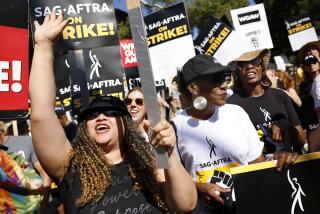‘99ers’ exhaust jobless benefits
- Share via
Karl Schafer says he has tried for hundreds of jobs since he was laid off from a truck factory more than two years ago. Still waiting to get hired, the 52-year-old Ohio man has suffered the indignity of applying for food stamps and asking his elderly mother for help.
Weary of her own job search, former customer service representative Wagma Omar, 40, of Mission Viejo is thinking about applying for a dangerous civilian job in Afghanistan.
And in California’s wine country, Kay Stephens, 56, is frantically looking to cut her living expenses so her unemployment doesn’t become a burden to her 30-year-old daughter.
Schafer, Omar and Stephens are among the increasing number of unemployed Americans whose burdens just got heavier: They’ve exhausted their 99 weeks of jobless benefits and must now figure out how to get by on ever more meager resources.
In California, state officials estimate there are nearly 100,000 people who are still looking for work but can no longer draw an unemployment check. Federal labor officials could not provide a number nationally, but private-sector experts say it could easily top 1 million.
What is certain is that, as the jobless rate remains stubbornly high, more Americans will have to face the challenge of making ends meet without a monthly check.
“People are going off a cliff and we’re not really doing anything about it,” said Andrew Stettner, deputy director of the National Employment Law Project. “That’s not great public policy.”
Once unemployment benefits run out, people are eligible for general relief -- but that pays a maximum of $221 a month in Los Angeles County, compared with as much as nearly $2,000 a month for unemployment. Only workers with dependent children are eligible for welfare.
Worried that they could lose their homes and get put out on the street, thousands of “99ers,” as they call themselves, are banding together to agitate for another extension. On Friday they’re kicking off a “Mayday SOS” campaign, faxing and e-mailing Congress their resumes, along with pleas for more benefits.
“The have-nots are going to be in great multitudes, and they will uprise,” said Donalee King, 51, of San Diego, who runs an Internet radio forum dedicated to the cause.
A series of extensions passed by Congress in 2008 and 2009 prolonged the benefits for an unprecedented period: 99 weeks in states with high unemployment, such as California. There have never been benefits available for so long, said Loree Levy, spokeswoman for the state Employment Development Department.
The last extension was approved in November 2009, giving the unemployed an extra 20 weeks of checks. But people eligible for those additional weeks are losing their benefits now, and a further extension is considered unlikely given the massive federal budget deficit.
That’s left the 99ers to fend for themselves. In interviews, people who have recently lost their benefits say they are pursuing a variety of strategies, including turning to family members for help, putting expenses on credit cards and applying for food stamps and other social services.
In Chicago, 55-year-old Cyndi Safstrom said she went through her retirement savings and is renting out rooms in her house to earn money. In Fresno, Rebecca Morgado, 34, had to tell her daughter that prom was out of the question, because her unemployment checks ran out and she hasn’t been able to find a job since being laid off as a food quality inspector.
Among unemployed people in their 50s, a common worry is that they will never find steady work again, forcing them to scrape by until they are eligible for Social Security benefits. In March there were 3.5 million unemployed people age 50 and older, Labor Department statistics show. That’s more than double the number in March 2008.
Schafer, the laid-off factory worker, is ashamed to admit that when his benefits ran out he turned to his elderly mother for financial assistance, even though her only income is Social Security. He also applied for food stamps. He’s luckier than most -- his wife is still employed, but the income from her job as a teacher’s aide isn’t enough to pay the bills, especially since they have college expenses for three children.
Schafer never went to college himself and figures he’s too old to go back to school. So he just keeps telling himself he’s going to find work, although the signs so far in his rural town have not been good.
“I’m a good worker, and it’s extremely hard,” Schafer said, the desperation creeping into his voice. “I was a $50,000-a-year worker, and now I’m reduced to zero.”
Some families are coping with unemployment by moving in together to cut costs. Omar lives free in her sister’s Mission Viejo home, as do another unemployed sister and their mother.
“It’s one person putting food on the table for everybody,” said Omar, who cashed her last unemployment check this month.
Omar is worried that if her sister loses her job, all four will be out on the street. Since getting laid off from her job as a customer service rep in 2008, she has applied to dozens of jobs, including some at McDonald’s, but still hasn’t found work. Omar, who speaks Dari and Pashto, is now thinking about applying to become a translator for the U.S. Army in Afghanistan.
“I’m at the point that I don’t want to be on the street,” she said. “I’m looking for anything that will pay me some money.”
Stephens says she has no family members to turn to -- her 86-year-old mother needs financial help herself, and her daughter is just squeaking by. She’s looking into programs that will give her low-income discounts on her auto insurance and electric bills now that her benefits have expired.
“I’m sick to my stomach with fear and anxiety,” said Stephens, who used to make her living in marketing for the wine industry. She has worked only sporadically since 2006.
Extending jobless benefits would be a relief to Stephens and others, but Congress is considered unlikely to do so, and some economists caution against it.
People who know they’ll keep receiving benefits “don’t rush to find new employment,” said Alan Reynolds, a senior fellow at the conservative Cato Institute. Data show that the long-term unemployed often find a job just as their benefits run out, he said.
King, who runs the Internet radio forum known as Jobless Unite, says she has applied for 3,000 positions since she lost her job in the mortgage industry. She’s angry at those who suggest that the unemployed just aren’t trying hard enough to find work.
“I see signs that say you don’t work, you don’t deserve to eat,” King said during a recent radio program. “You know what? We’re trying like hell to find jobs, but they’re just not out there.”
--
More to Read
Get the L.A. Times Politics newsletter
Deeply reported insights into legislation, politics and policy from Sacramento, Washington and beyond. In your inbox twice per week.
You may occasionally receive promotional content from the Los Angeles Times.











